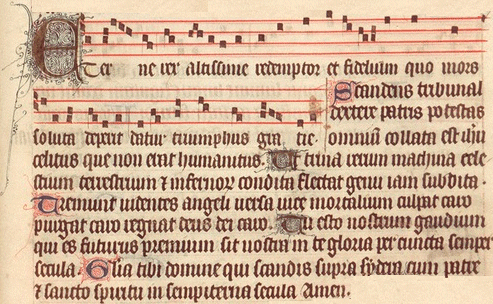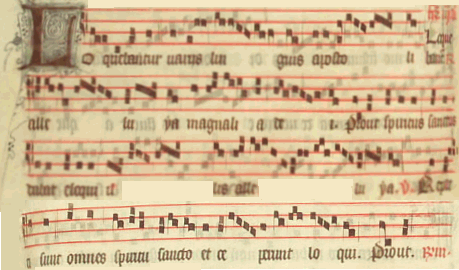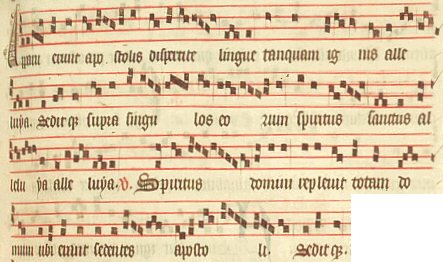Even Years: Vatican II, Lumen gentium, 4,12
| Opere autem consummato, quod Pater Filio commisit in terra faciendum (cf. Io. 17:4),
missus est Spiritus Sanctus die Pentecostes, ut Ecclesiam iugiter
sanctificaret, atque ita credentes per Christum in uno Spiritu accessum
haberent ad Patrem (cf. Eph. 2, 18). Ipse est Spiritus vitae seu fons aquae
salientis in vitam aeternam (cf. Io. 4, 14; 7, 38-39), per quem Pater homines,
peccato mortuos, vivificat, donec eorum mortalia corpora in Christo resuscitet (cf. Rom. 8:10-11).
| When the work which the Father gave the Son to do on earth was accomplished, the Holy Spirit was sent on the day of Pentecost in order that He might continually sanctify the Church, and thus, all those who believe would have access through Christ in one Spirit to the Father. He is the Spirit of Life, a fountain of water springing up to life eternal. To men, dead in sin, the Father gives life through Him, until, in Christ, He brings to life their mortal bodies.
| | Spiritus in
Ecclesia et in cordibus fidelium tamquam in templo habitat (cf. 1 Cor. 3:16;
6:19), in eisque orat et testimonium adoptionis filiorum reddit (cf. Gal. 4:6; Rom. 8:15-16 et 26). Ecclesiam, quam in omnem veritatem inducit (cf. Io.
16:13) et in communione et ministratione unificat, diversis donis hierarchicis
et charismaticis instruit ac dirigit, et fructibus suis adornat (cf. Eph. 4:11-12; 1 Cor. 12:4; Gal. 5:22).
| The Spirit dwells in the Church and in the hearts of the faithful, as in a temple. In them He prays on their behalf and bears witness to the fact that they are adopted sons. The Church, which the Spirit guides in way of all truth and which He unified in communion and in works of ministry, He both equips and directs with hierarchical and charismatic gifts and adorns with His fruits.
| | Virtute Evangelii
iuvenescere facit Ecclesiam eamque perpetuo renovat et ad consummatam cum
Sponso suo unionem perducit. Nam Spiritus et Sponsa ad Dominum Iesum dicunt: Veni! (cf. Apoc. 22:17).
| By the power of the Gospel He makes the Church keep the freshness of youth. Uninterruptedly He renews it and leads it to perfect union with its Spouse. The Spirit and the Bride both say to Jesus, the Lord, "Come!"
| | Sic apparet
universa Ecclesia sicuti de unitate Patris et Filii et Spiritus Sancti plebs
adunata
| Thus, the Church has been seen as "a people made one with the unity of the Father, the Son and the Holy Spirit."
| | Universitas
fidelium, qui unctionem habent a Sancto (cf. I Io. 2:20 et 27), in credendo
falli nequit, atque hanc suam peculiarem proprietatem mediante supernaturali
sensu fidei totius populi manifestat, cum ab Episcopis usque ad extremos
laicos fideles universalem suum consensum de rebus fidei et morum exhibet.
| ...The entire body of the faithful, anointed as they are by the Holy One, cannot err in matters of belief. They manifest this special property by means of the whole peoples' supernatural discernment in matters of faith when "from the Bishops down to the last of the lay faithful" they show universal agreement in matters of faith and morals.
| | Illo
enim sensu fidei, qui a Spiritu veritatis excitatur et sustentatur, Populus Dei
sub ductu sacri magisterii, cui fideliter obsequens, iam non verbum hominum,
sed vere accipit verbum Dei (cf. 1 Thess. 2:13), semel traditae sanctis fidei
(Iud. 3), indefectibiliter adhaeret, recto iudicio in eam profundius penetrat
eamque in vita plenius applicat.
| That discernment in matters of faith is aroused and sustained by the Spirit of truth. It is exercised under the guidance of the sacred teaching authority, in faithful and respectful obedience to which the people of God accepts that which is not just the word of men but truly the word of God. Through it, the people of God adheres unwaveringly to the faith given once and for all to the saints, penetrates it more deeply with right thinking, and applies it more fully in its life.
| | Idem
praeterea Spiritus Sanctus non tantum per sacramenta et ministeria Populum Dei
sanctificat et ducit eumque virtutibus ornat, sed dona sua dividens singulis
prout vult (1 Cor. 12:11), inter omnis ordinis fideles distribuit gratias
quoque speciales, quibus illos aptos et promptos reddit ad suscipienda varia
opera vel officia, pro renovatione et ampliore aedificatione Ecclesiae
proficua, secundum illud: Unicuique ... datur manifestatio Spiritus ad
utilitatem (1 Cor. 12:7).
| It is not only through the sacraments and the ministries of the Church that the Holy Spirit sanctifies and leads the people of God and enriches it with virtues, but, "allotting his gifts to everyone according as He wills,(114) He distributes special graces among the faithful of every rank. By these gifts He makes them fit and ready to undertake the various tasks and offices which contribute toward the renewal and building up of the Church, according to the words of the Apostle: "The manifestation of the Spirit is given to everyone for profit".
| | Quae
charismata, sive clarissima, sive etiam simpliciora et latius diffusa, cum sint
necessitatibus Ecclesiae apprime accommodata et utilia, cum gratiarum actione ac consolatione accipienda sunt.
| These charisms, whether they be the more outstanding or the more simple and widely diffused, are to be received with thanksgiving and consolation...
|
Odd Years: Augustine of Hippo, Treatise 87 on John, 1 (CCL 36, 543-544)
| Haec mando uobis, ut diligatis inuicem. ac per hoc intellegere debemus hunc esse fructum nostrum de quo ait: ego uos elegi ut eatis, et fructum afferatis, et fructus uester maneat. et quod
adiunxit: ut quodcumque petieritis patrem in nomine meo, det uobis, tunc utique
dabit nobis, si diligamus inuicem; cum et hoc ipsum ipse dederit nobis, qui nos
elegit non habentes fructum, quia non eum nos elegeramus, et posuit nos ut
fructum afferamus, hoc est, inuicem diligamus; quem fructum sine illo habere
non possumus, sicut palmites facere sine uite nihil possunt. caritas ergo est
fructus noster, quem definit apostolus: de corde puro et conscientia bona, et
fide non ficta. hac diligimus inuicem, hac diligimus deum.
| My command to you, says the Lord, is to love one another. This is the fruit we are asked to bear, according to that other statement of his: I have chosen you to go out and bear fruit, fruit that will endure. And when he adds, so that the Father may give you whatever you ask in my name, he clearly means that the Father will readily grant our requests provided that we love one another. But surely this love is his own gift to us, for he chose us while we lacked fruit of any sort —remember that it was he who chose us and not we him— and made it possible for us to bear fruit, in other words to love one another. We can never hope to bear such fruit unless he helps us with his grace—just as no branch can produce fruit unless it forms part of a living vine. Love, then, is our fruit; love that St Paul describes as springing from a pure heart, a good conscience, and sincere faith. Such is the source of our love for one another, and the source of our love for God.
| | Neque enim uera dilectione
diligeremus inuicem, nisi diligentes deum. diligit enim unusquisque proximum
tamquam seipsum, si diligit deum; nam si non diligit deum, non diligit seipsum.
in his enim duobus praeceptis caritatis tota lex pendet et prophetae: hic est
fructus noster. de fructu itaque nobis mandans: haec mando, inquit, uobis, ut
diligatis inuicem. unde et apostolus paulus, cum contra opera carnis commendare
fructum spiritus uellet, a capite hoc posuit: fructus, inquit, spiritus caritas
est; ac deinde cetera tamquam ex isto capite exorta et religata contexuit, quae
sunt, gaudium, pax, longanimitas, benignitas, bonitas, fides, mansuetudo,
continentia.
| Only if we love God can our love for one another be true love. If we love God, then we shall also love our neighbour as ourselves. Anyone who has no love for God has none for himself either. On the twofold precept of charity depends the whole of the Law and the Prophets. This love is the fruit the Lord has in mind when he says to us: My command to you is to love one another. That is why the Apostle Paul, contrasting the fruits of the Spirit with the works of the flesh, begins by saying: The fruit of the Spirit is love, and then enumerates all the rest as though they flowed from love and looked to it as their source; they are, he says, joy, peace, patience, kindness, goodness, fidelity, gentleness, and self-control.
| | Quis autem bene gaudet, qui
bonum non diligit unde gaudet? quis pacem ueram, nisi cum illo potest habere
quem ueraciter diligit? quis est longanimis in bono perseueranter manendo, nisi
ferueat diligendo? quis est benignus, nisi diligat cui opitulatur? quis bonus,
nisi diligendo efficiatur? quis salubriter fidelis, nisi ea fide quae per
dilectionem operatur? quis utiliter mansuetus, cui non dilectio moderetur? quis
ab eo continet unde turpatur, nisi diligat unde honestatur? merito itaque
magister bonus dilectionem sic saepe commendat, tamquam sola praecipienda sit,
sine qua non possunt prodesse cetera bona, et quae non potest haberi sine
ceteris bonis, quibus homo efficitur bonus.
| For who can properly rejoice, if they do not love some good in which to find their joy? Who can experience true peace, if they cannot be at peace with their beloved? Who will have the patience to persevere in doing good, if they are not constantly urged onward by love's prompting? Who will show kindness if they do not love those they set out to benefit? Who will be good if they are not made so by loving? Whose faith will profit them, but those whose faith works through love? How wise was our good Master when he so persistently recommended love to us as the one thing necessary, a treasure without which all other virtues avail us nothing, yet which cannot itself be had except in company with those other qualities which perfect us in virtue.
|
| |




